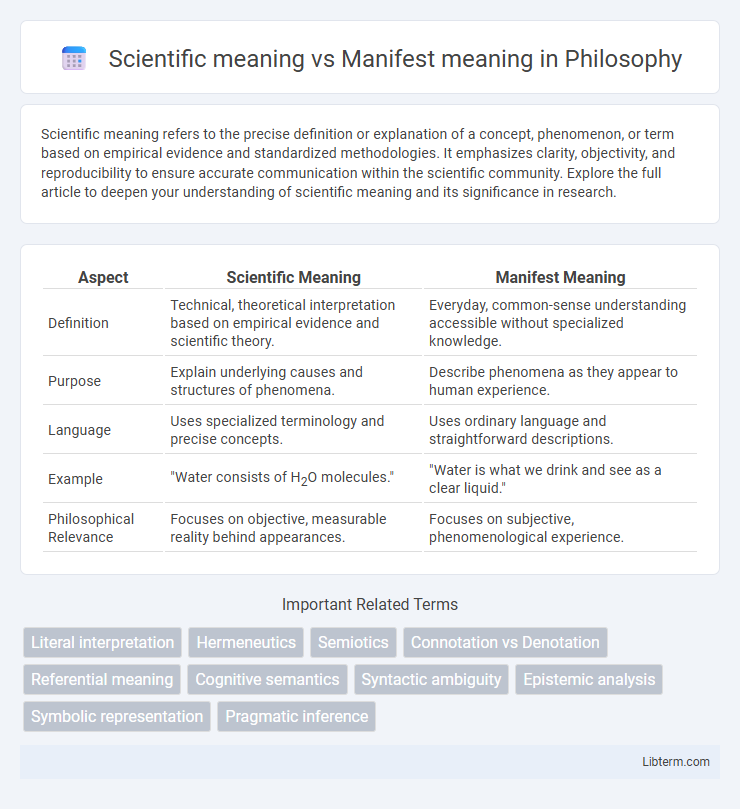Scientific meaning refers to the precise definition or explanation of a concept, phenomenon, or term based on empirical evidence and standardized methodologies. It emphasizes clarity, objectivity, and reproducibility to ensure accurate communication within the scientific community. Explore the full article to deepen your understanding of scientific meaning and its significance in research.
Table of Comparison
| Aspect | Scientific Meaning | Manifest Meaning |
|---|---|---|
| Definition | Technical, theoretical interpretation based on empirical evidence and scientific theory. | Everyday, common-sense understanding accessible without specialized knowledge. |
| Purpose | Explain underlying causes and structures of phenomena. | Describe phenomena as they appear to human experience. |
| Language | Uses specialized terminology and precise concepts. | Uses ordinary language and straightforward descriptions. |
| Example | "Water consists of H2O molecules." | "Water is what we drink and see as a clear liquid." |
| Philosophical Relevance | Focuses on objective, measurable reality behind appearances. | Focuses on subjective, phenomenological experience. |
Introduction: Defining Scientific and Manifest Meaning
Scientific meaning refers to the precise, systematic interpretation of concepts based on empirical evidence and theoretical frameworks within disciplines like physics or biology. Manifest meaning represents the straightforward, everyday understanding or surface-level interpretation of terms as used in common language and daily communication. Distinguishing between scientific and manifest meanings is crucial for effective knowledge dissemination and avoiding misconceptions.
Origins of Scientific Meaning
Scientific meaning originates from empirical observation, systematic experimentation, and logical reasoning, establishing objective and verifiable knowledge about phenomena. It contrasts with manifest meaning, which relies on subjective, everyday interpretations based on immediate perception and common experience. The foundation of scientific meaning emerges from the development of the scientific method during the Enlightenment, emphasizing reproducibility and evidence over intuition or tradition.
Understanding Manifest Meaning in Everyday Life
Manifest meaning refers to the obvious, surface-level interpretation of symbols, actions, or events that people recognize in everyday life without requiring specialized knowledge. It enables quick comprehension and communication by relying on shared cultural or linguistic cues, contrasting with scientific meaning that involves deeper, systematic, and often technical explanations. Understanding manifest meaning is crucial for navigating social interactions and making sense of daily experiences efficiently.
Key Differences Between Scientific and Manifest Meaning
Scientific meaning pertains to precise, often quantifiable explanations grounded in empirical evidence and systematic observation, while manifest meaning refers to the obvious, surface-level interpretation perceived by everyday understanding. Key differences include the depth of analysis, where scientific meaning involves theoretical frameworks and technical language, contrasting with manifest meaning's accessibility and reliance on common sense. Scientific meaning aims for objectivity and reproducibility, whereas manifest meaning centers on subjective, immediate comprehension.
Historical Perspectives on Meaning
Historical perspectives on meaning distinguish scientific meaning as the precise, testable, and context-independent interpretation of terms within a discipline, whereas manifest meaning reflects everyday, context-dependent understanding shaped by cultural and social factors. Philosophers like Frege and Carnap emphasized scientific meaning's role in logical clarity and empirical verification during the analytic tradition's rise. Meanwhile, phenomenologists and hermeneutic theorists highlighted manifest meaning's importance in interpreting human experience and historical texts, underlining the evolving nature of meaning across time.
Examples Illustrating Scientific Meaning
Scientific meaning refers to the precise, systematic understanding of terms based on empirical evidence and theory, such as "water" being H2O, emphasizing its molecular composition. For example, "light" in scientific meaning describes electromagnetic waves with specific wavelengths and frequencies, differing from everyday use as brightness. These examples highlight how scientific meaning provides clarity through measurable properties and definitions grounded in research.
Manifest Meaning: Insights from Philosophy and Culture
Manifest meaning refers to the everyday, surface-level understanding of concepts and experiences as they appear to human perception, shaped by cultural narratives and philosophical interpretations. In philosophy, thinkers like Wilfred Sellars emphasize manifest meaning as the pre-scientific, experiential grasp contrasting with scientific theories, highlighting its role in forming our intuitive worldview. Culturally, manifest meaning governs how societies interpret symbols, language, and traditions, anchoring collective identity and shared human experiences beyond empirical verification.
Challenges in Reconciling Scientific and Manifest Meanings
Reconciling scientific and manifest meanings presents challenges due to their fundamentally different approaches: scientific meaning relies on empirical evidence and theoretical frameworks, while manifest meaning is rooted in everyday experience and common language. This divergence causes difficulties in translating scientific concepts into accessible manifest terms without oversimplifying or distorting complex data. The inherent tension between precision and accessibility often leads to misunderstandings in public communication and interdisciplinary collaboration.
Implications for Knowledge and Communication
Scientific meaning relies on precise definitions and empirical evidence, enhancing clarity and replicability in knowledge acquisition. Manifest meaning reflects everyday language use and contextual interpretation, shaping how information is communicated and understood socially. The divergence between these meanings influences the accuracy of knowledge transmission and the effectiveness of communication across different disciplines and audiences.
Conclusion: Bridging Scientific and Manifest Understandings
Scientific meaning relies on empirical evidence and theoretical frameworks to explain phenomena objectively, while manifest meaning reflects the everyday, surface-level interpretations experienced subjectively. Bridging scientific and manifest understandings involves integrating precise data-driven insights with intuitive human experiences to foster comprehensive knowledge. This synthesis enhances communication and application across disciplines by aligning rigorous analysis with practical relevance.
Scientific meaning Infographic

 libterm.com
libterm.com